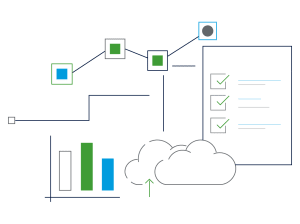The revolutionary reform of the National Court Register (NCR), which will soon come into force, may surprise some entrepreneurs. It will cover a very wide range of various technical changes, which fundamentally change the functioning of not only the registry itself, but above all force entrepreneurs into new responsibilities. As we have written about this recently, the financial statements will go first.
If you run a company that files financial statements to the National Court Register, be sure to read the following information and make sure that you are ready for changes.
Financial statements in the e-NCR in 2 stages
As of March 15, 2018, the amendment to the Act on the National Court Register provides for the obligation to submit financial reports and other accompanying documents only by electronic means.
Initially during the so-called transitional period (i.e. from March 15 to September 30, 2018), the legislator will allow for the attachment of copies (scans) of financial documents to the entry application in the form of an annual financial report, financial statement analysis report, copy of the resolution on approval, profit distribution or loss coverage, and activity reports (Article 69 of the Accounting Act of September 29, 1994 (Journal of Laws of 2017, item 2342).
Subsequently, starting from October 1, 2018, the obligation to submit and also prepare financial statements only in electronic format will enter into force.
Learn more about our services
Signatures of authorized persons
The above documents must be signed with a qualified electronic signature or a signature confirmed by the trusted ePUAP profile. Thus, the entrepreneurs will be forced to acquire electronic signatures.
In the transitional period, i.e. from March 15, 2018, the group of lucky ones will include at least one person whose PESEL [national personal identification number] was disclosed in the National Court Register and which was entered as a board member, shareholder, receiver or liquidator of the given company. If, however, the company's shareholder is not a natural person, the application is signed with an electronic signature by at least one person whose PESEL number has been disclosed in the National Court Register, entered as a board member, receiver, liquidator of the shareholder or a partner authorized to represent a partnership being the shareholder.
Ultimately, i.e. from October 1, 2018, the electronic signatures will also be required to sign all documents submitted to the e-NCR, which, in turn, must be signed by the entire management board of the capital company.
Since at the moment electronic signatures are associated with the possession of a Polish PESEL or NIP number, which the legislator refers to himself, it is not known what fate awaits foreign entrepreneurs who have companies in Poland where board members are foreigners and do not have an assigned NIP or PESEL number. Will their electronic signatures based on other identification documents work properly in the ICT system of the National Court Register? The near future will show.
Account in the S24 portal
The submission of financial documents takes place through an account, which is used to file pleadings in the registration proceedings. The account on the S24 portal is set up on the website of the Ministry of Justice (link: https://ekrs.ms.gov.pl/). The application should also include a statement confirming that the financial documents meet the requirements of the Accounting Act. The application is subject to automatic verification via the ICT system.
After a positive verification of the submitted application and completion of the registration procedure, all financial statements will be placed in the Repository of the Financial Documents (RFD), from where they will be sent via the same system to the Central Tax Data Registry kept by the Head of the National Tax Administration (Secretary of State).
Two steps more and one step less
As a positive solution resulting from the development of digitization, it is worth pointing out that the entrepreneurs will no longer be required to submit additional financial statements to the Tax Offices. These statements will be made available to the tax authorities directly by the Head of the National Tax Administration.
Problems of entrepreneurs with foreign capital
In accordance with the applicable regulations, a member of the company's management board, as well as its shareholder, may be a person who does not have Polish citizenship and does not permanently reside in the territory of Poland. However, it is worth noting that the amendment to the Act on the National Court Register imposes obligations on entrepreneurs, which will be very difficult for foreigners to meet, especially in such a short period as on March 15, 2018. Obtaining certified signatures, mastering the account servicing skills in the S24 portal, and additionally, acting in Polish only can be an insurmountable barrier for foreigners. Even in the case of a positive passage through all these difficulties, companies certifying signatures do not guarantee that these signatures, not related to the PESEL number or physically executed abroad, will work correctly in the judicial ICT system.
Hence our good advice: if you are an entrepreneur and plan to submit current or past financial statements to the National Court Register, it is better to do it immediately, because after March 15, 2018 you will encounter considerable difficulties.







